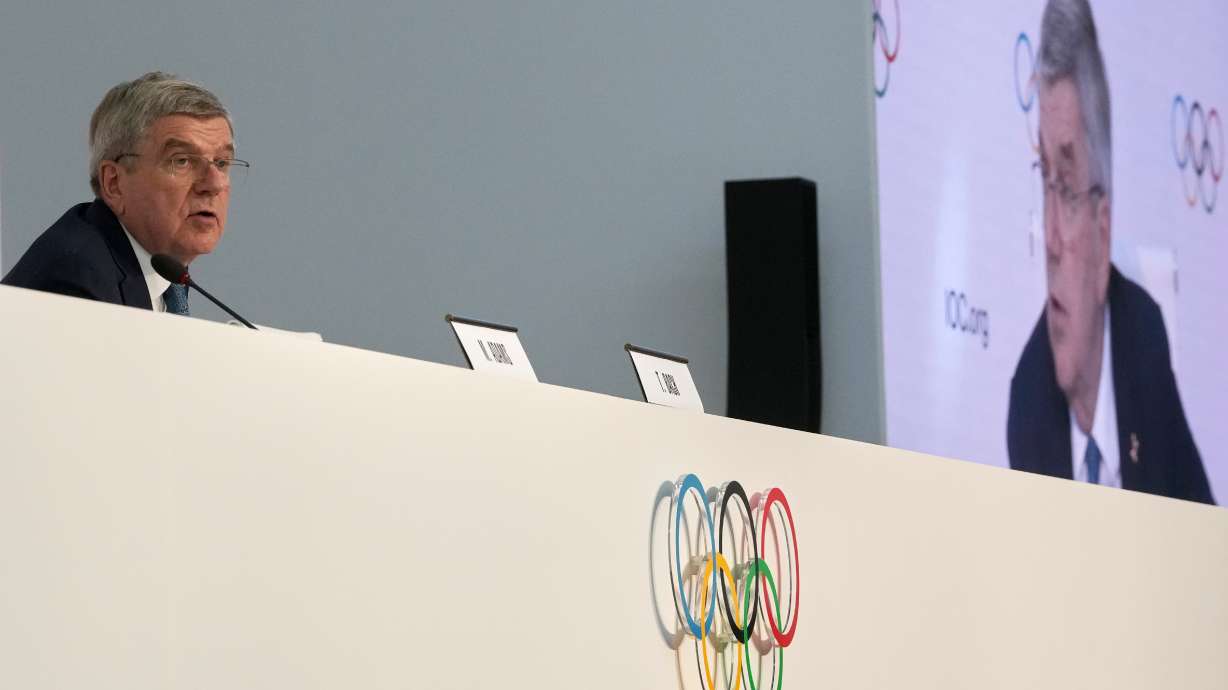Estimated read time: 5-6 minutes
- Outgoing IOC President Thomas Bach highlights diversity and climate change progress in sports.
- Bach praises Kirsty Coventry's election as IOC's first African and female president.
- Climate change impacts the Winter Games; the rotation among hosts and separation of sports is discussed.
COSTA NAVARINO, Greece — Outgoing International Olympic Committee President Thomas Bach touted the progress made on diversity, climate change and other issues he put front and center during his 12 years as a world sport leader but said there's still much work to be done.
The election of Kirsty Coventry, of Zimbabwe, as the IOC's first woman and first African president sent a "very important signal yesterday to demonstrate that we are a truly global organization," Bach told reporters Friday at the end of a week of meetings in Greece.
The 71-year-old German lawyer said he's one of eight of the IOC's now 10 presidents who are European, a list that includes one American, Avery Brundage, who held the post for two decades until 1972.

That leadership didn't reflect the IOC's reality, Bach said, which represent 206 national Olympic committees throughout the world. He said the first-round win in the presidential race for an IOC member from Africa shows "more than anything else, this commitment to globalization."
However, Bach stopped short of saying Coventry's election over six competitors marked a culmination of his reform agenda, which included a new, less formal bidding process used by Utah to secure the 2034 Winter Games.
"The Olympic agenda is not about one item or one topic. It's like a jigsaw puzzle where everything has to come together to give the Olympic movement new relevance and credibility," he said. "Diversity and gender equality is one of these pieces of the puzzle."

Will climate change concerns lead to rotating the Winter Games?
Climate change is another. During this week's annual IOC session, members heard about how organizers of the 2028 Summer Games in Los Angeles intend to be a catalyst for the city's recovery from January's deadly and destructive wildfires.
"It's a major challenge for the future of all of us," Bach said, pointing out in December 2022, the IOC announced a climate change study would be undertaken by its Future Host Commission, delaying an anticipated decision on advancing Winter Games hosts.
The initial results of that study spurred the IOC to make a dual award of both the 2030 and 2034 Winter Games last July. But not only will the French Alps host in 2030 and Utah, in 2034, Switzerland has been given special status as a bidder for 2038.
"We have gained some time for the Olympic Winter Games," Bach said.
But he said the "drastically diminished number" of potential Winter Games sites due to decreasing snowpack means changes are coming. That could include rotating the Winter Games among a set group of hosts, something Utah organizers have said they'd welcome.
In addition to establishing some type of rotation system, Bach said making "maybe a clearer separation between sports on snow and sports on ice" has been discussed by the commission that evaluated Utah's bid for another Olympics during a visit last April.
"The overall program of the Winter Games was under discussion, but the Future Host Commission needed further and more detailed studies and time. This is why we wanted to secure the future of the Olympic Winter Games with this double ... even triple allocation," Bach said.
Global warming is also affecting the Summer Games, he said, making it too hot for some places to host during the traditional time frame. Sooner or later, Bach said the sports calendar will have to be altered for the Olympics as well as other events.
Still, he said, the IOC has "done a lot in the fight against climate change," citing reductions in the carbon footprint of the organization's new Swiss headquarters as well as the 2024 Summer Games in Paris, and the planting of an "Olympic Forest" in Africa.
The IOC aligned with the Paris Agreement on combating climate change in 2021. President Donald Trump signed an executive order on his first day in office once again withdrawing the United States from the United Nations treaty.
What's happening with the conflict that changed Utah's host contract?
Another issue where there's a split between the U.S. and international interests is anti-doping. Friction between the U.S. and international anti-doping agencies sparked last-minute changes to the contract to host the Olympics in 2034 that was signed by Utah Gov. Spencer Cox.
A new termination clause spells out that Utah could lose the Games if "the supreme authority of the World Anti Doping Agency in the fight against doping is not fully respected or if the application of the World Anti-Doping Code is hindered or undermined" by the United States.

Bach said he won't get involved in the ongoing dispute in his remaining days in office. Under a new transition process, he is set to leave the IOC when Conventry's eight-year term begins on June 24.
"This is an issue between (World Anti Doping Agency) and the United States," he said.
The U.S. Olympic and Paralympic Committee is taking the lead on trying to resolve the tensions which came to a head over a U.S. government investigation into Chinese swimmers who tested positive for a banned substance being allowed to compete.
His hope, Bach said, is that the USOPC's efforts "will finally contribute to find a solution and to calm down this heated debate" between WADA and the U.S. Anti-Doping Agency.









